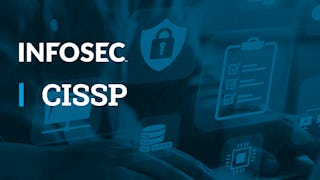Filter by
SubjectRequired
LanguageRequired
The language used throughout the course, in both instruction and assessments.
Learning ProductRequired
LevelRequired
DurationRequired
SkillsRequired
SubtitlesRequired
EducatorRequired
Explore the Internet Security Course Catalog
 Status: Free Trial
Status: Free TrialUniversity of London
Skills you'll gain: Computer Security Incident Management, Linux, Network Security, Cyber Governance, OSI Models, Incident Management, Incident Response, Security Management, Linux Commands, TCP/IP, Computer Systems, Threat Modeling, Command-Line Interface, Network Protocols, Computer Networking, Cybersecurity, Cyber Security Strategy, Human Factors (Security), Cyber Threat Intelligence, Cyber Attacks
 Status: Free Trial
Status: Free TrialSkills you'll gain: IT Security Architecture, Network Security, Computer Security, Application Security, Security Controls, Cybersecurity, Security Awareness, Cyber Attacks, Encryption, Data Security, Cryptography, Security Management, Authorization (Computing), Threat Management, Firewall, Network Administration, Authentications, Threat Detection, Hardening, Malware Protection
 Status: NewStatus: Free Trial
Status: NewStatus: Free TrialSkills you'll gain: Information Systems Security, Risk Management, Continuous Monitoring, Information Assurance, Cyber Governance, Governance, Cybersecurity, Security Controls, Business Risk Management, ISO/IEC 27001, Threat Modeling, Risk Analysis, Threat Management, Vulnerability Assessments, Regulatory Compliance, System Monitoring, Information Systems, Asset Management, Intellectual Property
 Status: NewStatus: Free Trial
Status: NewStatus: Free TrialGoogle
Skills you'll gain: Hardening, Distributed Denial-Of-Service (DDoS) Attacks, Incident Response, Network Architecture, Network Security, Computer Security Incident Management, Intrusion Detection and Prevention, Incident Management, Network Protocols, Threat Detection, Event Monitoring, Threat Management, Network Infrastructure, Security Controls, Cybersecurity, System Monitoring, Operating Systems, Linux, Bash (Scripting Language), Databases
 Status: Preview
Status: PreviewUniversity of Michigan
Skills you'll gain: Network Security, Network Protocols, Network Architecture, TCP/IP, Web Applications, Computer Networking, Encryption, Network Infrastructure, Innovation, Hypertext Markup Language (HTML)
 Status: NewStatus: Free Trial
Status: NewStatus: Free TrialLearnKartS
Skills you'll gain: Security Controls, Threat Management, Cybersecurity, Cyber Attacks, Public Key Infrastructure, Encryption, Threat Detection, Cryptography, Data Security, Continuous Monitoring, Security Management, Compliance Management, Zero Trust Network Access, Information Assurance, Vulnerability Management, Governance Risk Management and Compliance, Data Encryption Standard, Blockchain, Data Integrity
What brings you to Coursera today?
 Status: NewStatus: Free Trial
Status: NewStatus: Free TrialLearnKartS
Skills you'll gain: Cybersecurity, Threat Management, Cyber Attacks, Threat Detection, Cloud Security, Disaster Recovery, Network Security, Malware Protection, Data Security, Intrusion Detection and Prevention, Hardening, Systems Architecture, Encryption
 Status: Free Trial
Status: Free TrialSkills you'll gain: Networking Hardware, TCP/IP, Network Security, Network Protocols, Endpoint Detection and Response, Network Routing, Cybersecurity, Local Area Networks, Dynamic Host Configuration Protocol (DHCP), Firewall, General Networking, Information Systems Security, Intrusion Detection and Prevention, Endpoint Security, Network Infrastructure, Network Planning And Design, Wireless Networks, Security Information and Event Management (SIEM), Network Analysis, Data Loss Prevention
 Status: Free Trial
Status: Free TrialSkills you'll gain: Cybersecurity, Security Controls, Cyber Attacks, Security Management, Cyber Security Strategy, Incident Response, Cyber Risk, Security Information and Event Management (SIEM), Information Assurance, Data Ethics, Network Analysis, Ethical Standards And Conduct
 Status: NewStatus: Free Trial
Status: NewStatus: Free TrialGoogle
Skills you'll gain: Security Controls, Infrastructure Security, Cloud Infrastructure
 Status: NewStatus: Free Trial
Status: NewStatus: Free TrialSkills you'll gain: Distributed Denial-Of-Service (DDoS) Attacks, Cybersecurity, Network Protocols
 Status: Free Trial
Status: Free TrialSkills you'll gain: Threat Management, Cybersecurity, Risk Management, Incident Response, Vulnerability Management, Security Information and Event Management (SIEM), Security Controls, Information Systems Security, Enterprise Security, Risk Analysis, Threat Detection, Information Assurance, Open Web Application Security Project (OWASP), Auditing, Compliance Auditing
Internet Security learners also search
In summary, here are 10 of our most popular internet security courses
- Cyber Security – Technology and Governance: University of London
- IT Security: Defense against the digital dark arts : Google
- CISSP Domain 1: Security and Risk Management: Infosec
- Google Network Security: Google
- Internet History, Technology, and Security: University of Michigan
- Information Security Foundations: LearnKartS
- Cybersecurity Threats and Defense: LearnKartS
- Computer Networks and Network Security: IBM
- Foundations of Cybersecurity: Google
- Security Hardening: Google










